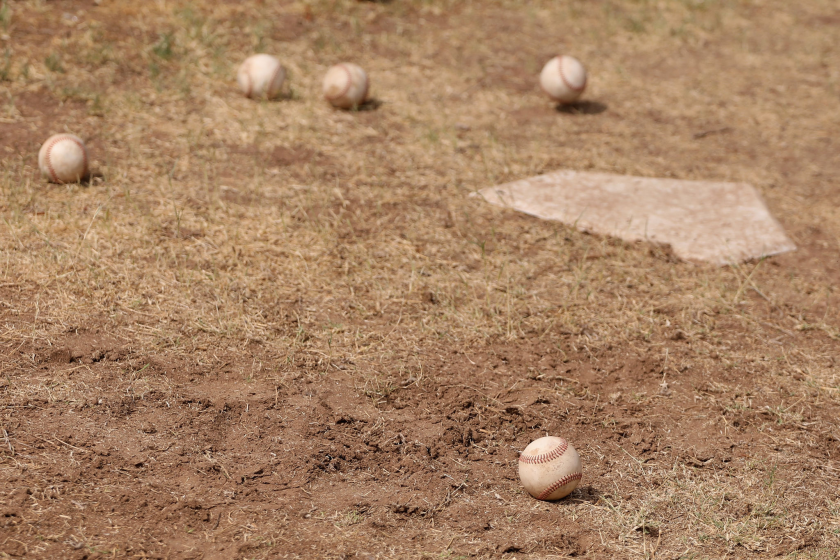SUPER BOWL XXI : DENVER vs. NEW YORK : LITTLE GIANT : Diminutive Joe Morris Earns Squatter’s Rights in Weight Room, on Field
- Share via
To understand the gift of Joe Morris on Super Bowl Sunday, you must go back to March, April, May and June.
You must observe Morris, away from anything you might think glamorous, talking to himself in the corner of the New York Giants’ weight room.
You must hear Morris howling like a coyote to no one.
It is in this room that Morris takes the weight of a bar and a world on his shoulders. Each excruciating leg squat of 555 pounds is delivered with a message and purpose.
There is a squat to answer every newspaper clipping that questioned his ability. There is one for a coach who benched him, a writer who crossed him, a fan who mocked him and a creator who left him standing at just 5 feet 7 inches tall.
“I remember everything,” Morris said.
There is an edge to Morris that could cut through glass. He is like a shark that would die if it ever stopped moving. The day Morris stops fighting is the day he stops running the football.
He is driven by a will to survive in a world he is convinced never wanted him.
There seems no end for Morris. No resolution. No peace. Not even after a season in which he gained 1,516 yards and helped lead a team into Super Bowl XXI against the Denver Broncos. Not after two Pro Bowl appearances in two years.
Morris continues to run through barriers, real or imagined.
“I’ve always got to prove myself,” he said. “It’s a never-ending battle, something that will go on year after year. I just want people to say that Joe Morris does his job, not that he’s too small. Just that I’ve done my job.”
And what if they say that?
“Then I want more,” he said. “I want to be put in another category. Then I’ve got to be in a category above respect.”
You cannot make Morris forget the past and enjoy the present. You cannot convince him that he had made believers of those who doubted there was a place in the National Football League for 5-7, 195-pound halfbacks.
Morris has his reasons.
A few reporters were trying to convince Morris of his greatness at an interview session Monday.
As they were trying, a microphone moved in front of Morris’ face.
Joe, is it true you’re not as good a runner on natural turf?
Morris played three games on natural turf this season. He gained 110 yards against the Raiders in Los Angeles Sept. 21 but had a total of 78 yards in the two other games, against San Francisco and Washington. Morris explained that it made little difference to him.
The interview continued, with writers again wondering why Morris can’t lighten up and enjoy the moment.
Then it was another microphone and another question.
Joe, the natural turf, is it different than running on artificial turf ?
Seconds later, another question.
Joe, your brother Jamie had trouble on the Rose Bowl turf when Michigan played here in the Rose Bowl .
Morris had heard enough.
“Listen,” Morris said. “I’m going to mimeograph these grass statements. It’s no big deal about the grass.”
Somehow, the interview continued. Someone asked Morris about comments from Denver linebacker Karl Mecklenburg, who was quoted as saying he feared Seattle’s Curt Warner more than he did Morris.
Again, it was Morris on the defense.
“That’s his opinion,” Morris said. “In this game, people will say things. You people say I can’t run in grass, and I’ll have to show you.”
Morris was wondering if Eric Dickerson ever had days like these.
For Morris, the struggle in his mind is no different now than it was growing up in Southern Pines, S.C., when he was convinced he had to beat up neighborhood kids for no other reason than that they were bigger. Morris has always thought of height as offensive.
In Southern Pines, there were rock fights the likes of which you’ve probably never seen. The object, Morris said, was to send a kid home crying. Especially bigger kids.
Morris’ father was fighting in Vietnam, and little Joe was in trouble at school.
Morris said his mother sat him down one day and asked him what his father might think of his behavior. Morris said he did think and decided from that day on to turn his energy and anger inward.
It’s the same Joe Morris you see today on the field and in the weight room; a Morris who dares a world to tell him no.
Morris went to college at Syracuse, against the advice of nearly everyone he knew, but he wound up breaking all of Larry Csonka’s rushing records.
The fight had just begun, though. For although the Giants made Morris their second-round draft choice in 1982, the team saved their first-round pick for another running back, Butch Woolfolk of Michigan.
And, if someone really believed in Morris, why did the team use its first-round pick of 1984 on another running back, George Adams?
Why? Perhaps it was because the only one who truly believed in Joe Morris was Joe Morris.
Deep down, that’s the way he saw it.
The early Giant years were hard on Morris. He carried the ball just 50 times for 193 yards his first two seasons.
Morris, as he said, would not forget a thing that was said about him then. He stored in his memory every reference to his lack of height and durability.
“I’m not going to repeat any of them,” Morris said of those memories. “They’re mine to have. I remember things with negativity, and that’s fine. But you can also do something about a statement.”
It was during the struggling times that Morris found solace in Johnny Parker’s weight room.
Parker, a strength and conditioning coach, joined the Giants in the spring of 1984. He incorporated his theories on weightlifting after visits to Soviet weight-training facilities.
Two years ago, the Giants sprung for a new weight room at a cost of $200,000. There are 10 framed pictures of Soviet lifters hanging from its walls. Parker has had trouble keeping Morris out since the day they cut the ribbon to open the place.
“After road trips, I’ve had to spend nights in the weight room just to make sure I beat Joe into the weight room the next day,” Parker said in all seriousness.
So is there any wonder where Joe Morris draws the strength to be one of the strongest players on the roster?
“Not pound-for-pound one of the strongest players,” Parker said. “One of the strongest guys, period.”
He’s in the same weightlifting league as defensive end Leonard Marshall, 6-3 and 285; nose tackle Jim Burt, 6-1 and 260; defensive end Eric Dorsey, 6-5 and 280, and tight end Mark Bavaro, 6-4 and 245.
Morris does not lift weights the way you lift weights. He doesn’t look in the mirror and flex after each set.
Parker said that what makes the Giants different from other teams is that they concentrate their lifts to strengthen the lower back and legs.
Standing with a bar on his shoulders, Morris can full squat 555 pounds three times, an almost unthinkable weight for a man his size.
“You have to see him work to understand,” Parker said. “Before he does his sets, you may see him in the corner talking to himself. His concentration is so total, so absolute, that he’s able to generate every bit of mental and physical force.
“This is not a fake thing you see on TV with guys beating their heads against. Every bit of life force goes into his lift. There’s nothing left.”
Of the 30 or so players who have participated in Parker’s year-round lifting program the last two years, only two players--Burt and tight end Zeke Mowatt--have missed games because of injury.
Morris starts his off-season conditioning program in March. He works out four days a week. And the Giants, unlike many NFL teams, do heavy lifting during the season.
“Why waste your time being strong in April,” Parker said. “You don’t play anyone then. You want to be the strongest at the Super Bowl.”
Lifting during the season hasn’t hurt Morris. On the Wednesday before the 16th game of the 1985 season, Morris set a personal record in a lift called the power clean. Four days later, he rushed for 202 yards against the Pittsburgh Steelers.
There are those around the league of course, who are convinced that Morris uses steroids.
“Morris is the guy everyone thinks is doing the stuff,” Parker said. “But there’s no amount of money on earth that could tempt Joe Morris to take a steroid. We have no guys taking the stuff. When you’re a strong team, you’re always suspected,”
But there is no doubt that the weight room has become Morris’ sanctuary. There, Morris has spent long hours in loneliness and sweat.
“He’s a strange combination,” said Mecklenburg, the Bronco linebacker whose job Sunday will be to stop Morris. “He’s a small power runner. You don’t see him until he gets to the hole. And then if you arm-tackle him, he’ll break it. He has good vision and when there’s a crack, he gets there as quickly as any back in the league.”
Still, Mecklenburg would not apologize for saying he’d rather face Morris than Warner, who rushed for 192 yards against the Broncos in the final regular-season game.
“What Curt Warner did to this defense, I’ve never seen a guy to do to this defense,” Mecklenburg said.
Joe Morris wouldn’t expect any more. He doesn’t need compliments. He doesn’t accept compliments. You get the idea that the day Morris is satisfied is the day he’ll retire. When the burning in his stomach leaves, so will Morris.
He says it will be a warm December day in New Jersey before someone can call him a great back without hanging a qualifier on it.
“Maybe when I’m 50 years old,” he said. “Some guys might be on a street corner and one of them might say, ‘Hey, that guy was OK.’ But not while I’m in the game.”
More to Read
Go beyond the scoreboard
Get the latest on L.A.'s teams in the daily Sports Report newsletter.
You may occasionally receive promotional content from the Los Angeles Times.











